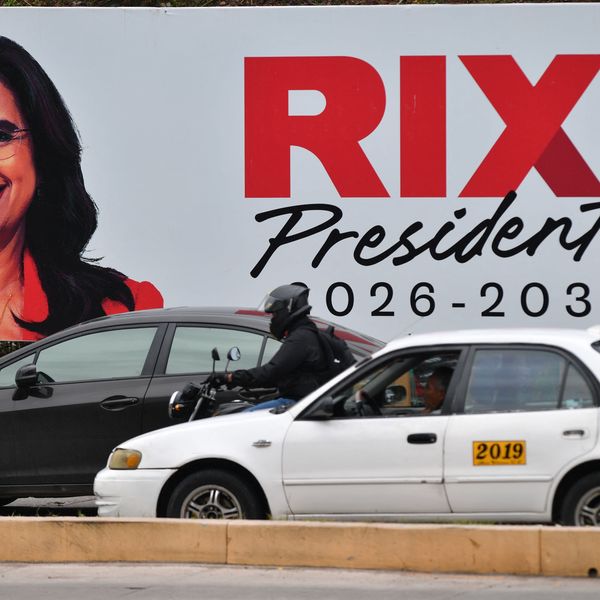Hondurans are still suffering from the effects of the June 2009 military coup that overthrew the democratically elected government of President Manuel Zelaya. The coup has unleashed a wave of violence against political opposition, journalists, small farmers and others, with impunity for the security forces that have been implicated in these killings. This is exactly what those who opposed the coup regime - and its consolidation of power with marred "elections" in November 2009 - feared would happen.
On the wrong side of this fight was the Obama administration, which - after some hesitation - made some statements against the coup but went on do quite a bit to help the coup government succeed. Nearly three years and hundreds of political murders later, it seems that this administration is still on the side of repression and denial of Hondurans' basic human rights.
Nothing has made this clearer than the attempts of Democratic members of the US Congress to pressure the administration to change course. On 9 March, 94 members of the US House of Representatives sent a letter to Secretary of State Hillary Clinton asking her "to suspend US assistance to the Honduran military and police given the credible allegations of widespread, serious violations of human rights attributed to the security forces".
The members of Congress note a "pattern of human rights violations in which human rights defenders, journalists, community leaders and opposition activists are the subject of death threats, attacks, and extrajudicial executions". They call particular attention to the situation in the Bajo Aguan region, about 350 miles north-east of the capital, where "45 people associated with peasant organizations have been killed." This violence, which is committed by landowners' gunmen and security forces against peasants struggling for land rights, is a direct result of the coup; under the Zelaya administration, there were negotiations taking place to resolve the disputes peacefully.
The letter from members of Congress is politically striking because it is signed by close to half of all the Democrats in the House, including some in leadership positions. This is an election year, and these people are not eager to fight with their president over an issue that is not likely to be a key concern in their districts. So they must have been quite convinced that these are outrageous violations of human rights - on which our government has a responsibility to act.
But the major media in the US did not seem to notice this letter or its political significance. And there were no reports at all on a similar letter to Secretary Clinton four days earlier, from a number of US senators who expressed their concern over "credible reports of killings and violent attacks that allegedly involve police and military agents", and "the failure of [Honduran] state authorities to prosecute violators and protect the rights of victims and their families".
These omissions are even more striking as Vice-President Biden travelled to Honduras on 6 March, putting the country in the news cycle. The major media serve as enabler in this circumstance by not reporting this congressional action by so many members of President Obama's own party. The administration looks to the press and, seeing nothing, reasons that if nobody heard this big tree falling in the forest, then it didn't happen.
There has been no response so far from the State Department, other than a highly misleading statement regarding what the 94 members of Congress were asking for. Whereas the letter call for a suspension of US assistance to the Honduran military and police, as long as the killings continue with impunity, spokesperson Victoria Nuland said:
"I think the concerns that we have with this particular proposal is that it calls for a cutting of all aid to Honduras ... this recommendation to cut it all off is a relatively blunt instrument." (Emphasis added.)
Worse, in fact, the Obama administration has increased requested military aid for Honduras for fiscal year 2012 - one of only two increases in the region (the other being Mexico). The excuse, of course, is the infamous "war on drugs". One has to wonder what the US government would do if the violence associated with drug-trafficking were ever to subside. It has been so convenient to the US in building up its military and security presence in the region - and the political influence that goes with it. Perhaps that is part of the reason why the Obama administration has been so cold to talk of legalization of some drugs, which we've heard even from US-supported presidents such as Otto Perez Molina of Guatemala and Juan Manuel Santos in Colombia, as well as a number of prominent former presidents and leaders.
In the past decade-and-a-half, South America has liberated itself from Washington, winning a historic "second independence" that makes it almost impervious to the kind of US-supported coups that threw Honduras into this wave of violence and repression. These governments unanimously distanced themselves from Washington by demanding the unconditional return of President Zelaya in 2009 and opposing the "elections" held that year to consolidate the coup government.
But the nations of South America need to do much more, and begin to see Central America and the Caribbean as part of their region, and not, as Washington sees it, "our little region over here, which never has bothered anybody". The Cartagena agreement that allowed for Zelaya's return contains human rights guarantees, and authorises other South American countries (besides Colombia and Venezuela, which brokered the agreement) to participate in ensuring compliance.
Hondurans are fighting courageously for their human rights and national sovereignty. With help from South America, and from all the organizations and activists who succeeded in getting 94 members of the US Congress to challenge the Obama administration over their complicity, they will put an end to this violent repression.




